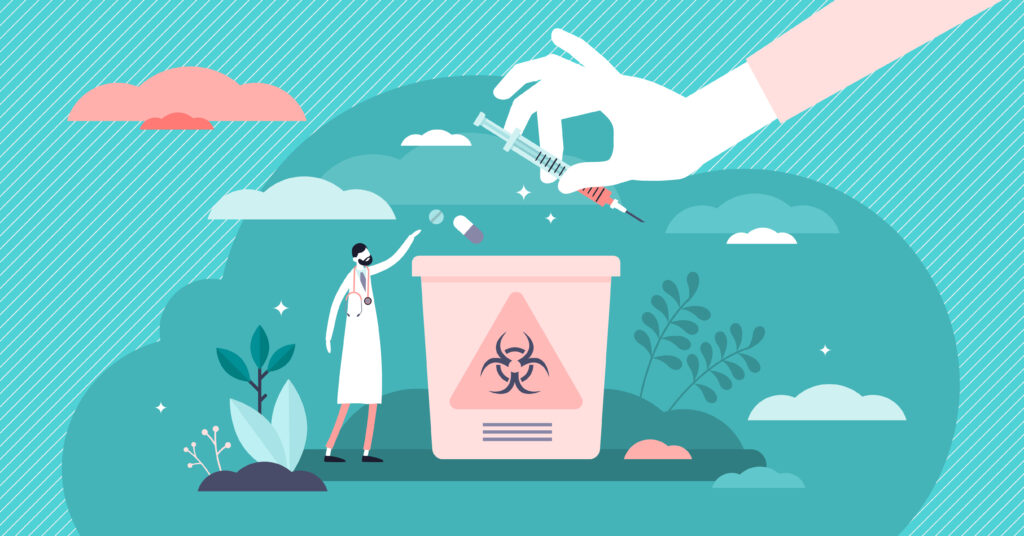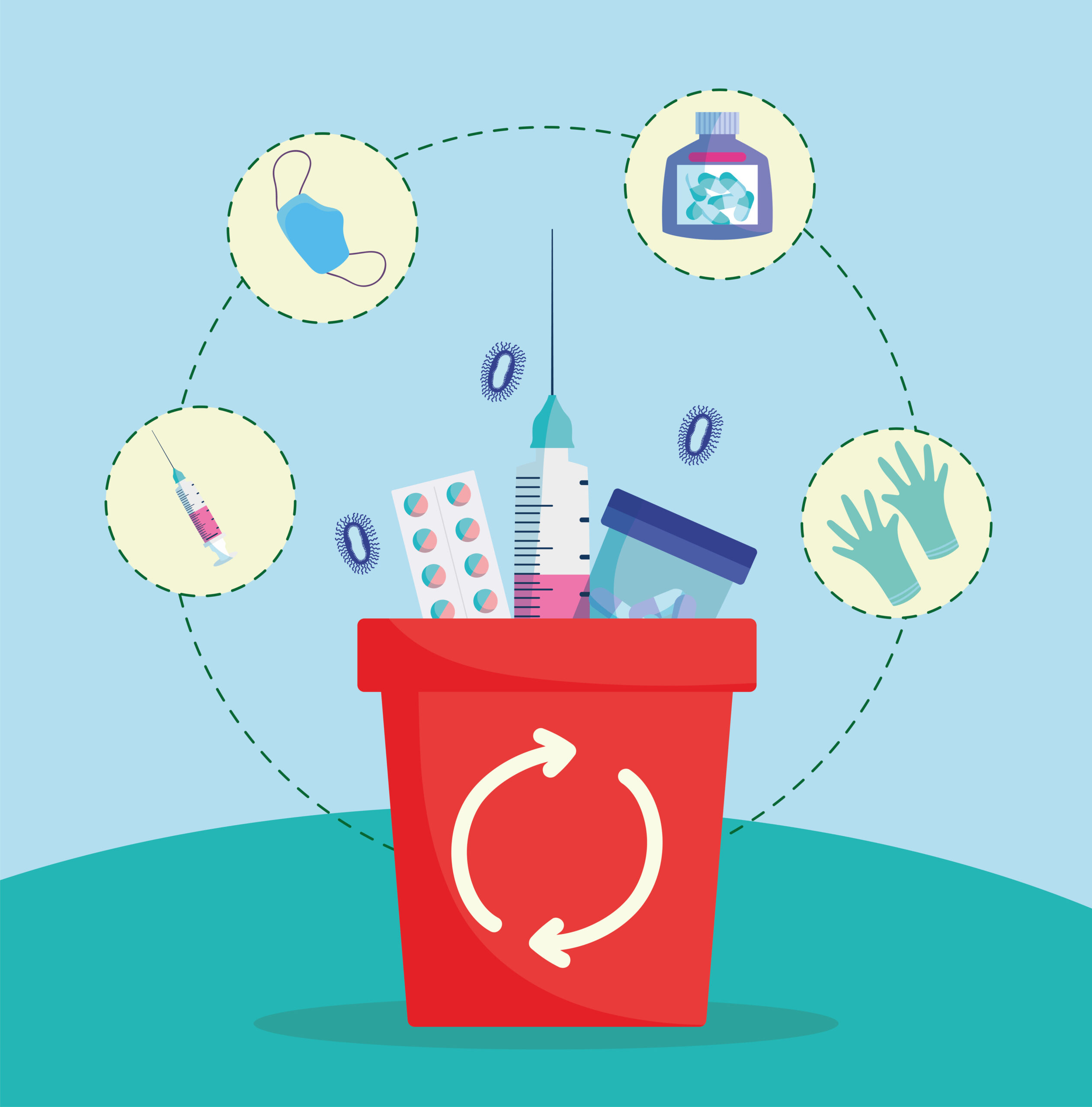What Is Medical Waste—and Why Should Businesses Care?
Medical waste includes anything contaminated with blood, bodily fluids, or other potentially infectious materials. From needles to lab samples, it’s produced in nearly every healthcare setting—hospitals, dental practices, labs, and even some corporate offices with onsite health services.
This isn’t just a clinical issue. For businesses, proper medical waste handling is about more than compliance. It’s about protecting your people, your reputation, and your bottom line. Improper handling can result in fines, legal action, or worse—serious health risks for employees and the community.
The High Stakes of Improper Medical Waste Disposal
Let’s not sugarcoat it: failing to dispose of medical waste correctly can have real-world consequences. Bloodborne pathogens, for example, can survive outside the body and lead to infections if waste isn’t contained and treated properly. A stray needle or contaminated dressing could put janitorial staff, patients, and even the public at risk.
Beyond safety, compliance is non-negotiable. Regulatory bodies like OSHA, the EPA, and state health departments have detailed rules for how medical waste must be stored, transported, and destroyed. Falling short here can mean hefty fines and even damage to your business’s credibility.
How Medical Waste Is Safely Disposed Of

Medical waste doesn’t just disappear. It’s neutralized through specific, regulated processes—each designed to eliminate pathogens and reduce environmental impact.
Here’s how it works:
Incineration: This method uses extreme heat to destroy waste entirely. It’s particularly effective for pathological and pharmaceutical waste. However, it must be carefully monitored to meet environmental emissions standards.
Autoclaving: A safer, more sustainable method for many types of waste. Think of it as a giant pressure cooker—steam sterilizes the waste, which is then safely discarded.
Microwave and Chemical Treatment: These technologies use thermal energy or chemical disinfectants to render waste non-infectious. They’re ideal for smaller volumes and specific waste types.
Electropyrolysis: An advanced, eco-conscious method that uses electricity to break down waste at the molecular level. It’s gaining traction in sustainability-forward healthcare systems.
Once treated, waste is compacted and transported to a landfill or a Waste-to-Energy (WTE) facility to generate clean electricity. facility. At Applied Innovation, we ensure every step is handled with care, transparency, and full documentation.
Know Your Regulators: Who Oversees Medical Waste?
If you’re in a leadership, compliance, or legal role, knowing which agencies have a say in medical waste disposal is crucial. Here’s a quick overview:
OSHA focuses on keeping your employees safe, particularly around sharps and other hazardous exposures.
EPA monitors how waste disposal affects the environment, especially emissions from incineration.
FDA regulates the packaging and devices used to collect waste—like sharps containers.
DOT ensures waste is safely transported according to national guidelines.
State Environmental and Health Departments provide specific guidelines for disposal within each state.
Sharps Waste: The Most Dangerous Trash in the Building

Needles, scalpels, and other “sharps” don’t just pose a poke hazard. They’re among the most dangerous types of medical waste—capable of transmitting serious diseases if handled improperly. Unfortunately, they’re also among the most likely to be mismanaged.
We help eliminate that risk by offering FDA-cleared sharps containers in a variety of sizes. We also provide scheduled pickup or mail-back options, so your staff never has to guess what to do next. With Applied Innovation, safety becomes second nature—not an afterthought.
To prevent needlestick injuries:
- Always use FDA-cleared, puncture-resistant sharps containers.
- Place sharps containers close to the point of use.
- Never dispose of sharps in regular trash or recycling bins.
- Follow state-specific regulations on sharps disposal.
The Full Lifecycle of Medical Waste Management
Managing medical waste is more than tossing used supplies into a red bin. It’s a coordinated system that starts the moment waste is created.
Waste Generation
From routine vaccinations to lab testing, healthcare teams generate waste all day long. The key is knowing what’s hazardous and what’s not.Segregation at the Source
Red bags for biohazards, puncture-proof containers for sharps, and separate bins for pharmaceuticals—sorting waste correctly at the source is the first step toward compliance.Safe Storage and Labeling
Containers must be sealed, labeled, and stored in secure, designated areas. Improper labeling is one of the top OSHA violations—and an avoidable one.Transport and Treatment
We handle the logistics, using licensed transportation and environmentally responsible treatment options, so you stay compliant without lifting a finger. Waste is either sterilized, incinerated, or treated with alternative technologies.Final Disposal and Documentation
Once waste is rendered non-infectious, it is either landfilled or processed into clean energy at a WTE facility. We provide full waste manifests so you can prove compliance at any time.
A Greener Path Forward: Sustainability in Medical Waste
In an era of growing environmental consciousness, more organizations are asking how they can reduce their footprint—even in clinical settings. Applied Innovation supports greener alternatives like reusable sharps containers and advanced sterilization technologies that minimize emissions and landfill use.
Plus, we help you align with sustainability goals without sacrificing safety or compliance. Our Waste-to-Energy partnerships turn treated waste into usable power, giving your organization an opportunity to make a meaningful environmental impact.
Partnering for Safe & Efficient Medical Waste Disposal
We’re not just another vendor—we’re your partner in safe, smart, and sustainable medical waste disposal. As a locally based company, we offer the flexibility, speed, and personal touch that national chains can’t match.
Whether you run a healthcare facility, manage operations for a multi-site enterprise, or oversee compliance and risk, we tailor our services to meet your needs. With transparent pricing, customizable pickup schedules, and a team of friendly experts who actually answer the phone, we’re here to make your job easier—and your business safer.
Let’s handle the waste so you can focus on what matters most.
